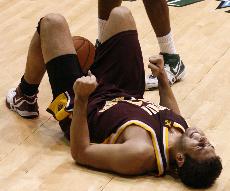Games in between tiny NAIA schools and NCAA mid-major universities typically distinguish the men from the boys in a pretty dramatic fashion.
In the Wolfpack’s 66-53 loss against down-the-block nemesis Tulane, an inspired effort blurred that distinction to the point where it was hard to tell who was the mid-major and who was the NAIA underdog.
That’s because until 1:59 left in regulation, Loyola faced a manageable 59-50 deficit and had a legitimate shot to win the game.
SUPER MARIO, THE HOWLIN’ WOLF
Finance junior forward Mario Faranda stepped onto the court, sized up Tulane’s David Gomez, out-jumped him, and won the opening tip.
In quick order, Faranda catalyzed the defiant effort with which Loyola battled on the Fogelman floor the rest of the night by rejecting 6-foot-8 Kory Castine’s bid to the basket.
Down 4-0 after a pair of Ryan Williams’ free throws, Faranda collected a loose ball by Tulane’s basket and thundered the rim with a two-hand dunk.
On Tulane’s ensuing possession, he drew a charge from Castine and sidelined him with his second foul. Faranda pumped his arms and howled in celebration, enlivening both a seismic cheer from the student section and bringing Loyola’s bench to its feet.
Before long, he had six rebounds, a steal, a pair of assists and a block. And after a Torry Beaulieu three put Loyola ahead 5-4, it was all-systems go for the Wolfpack.
Until Faranda tried to beat Daniel Puckett on the dribble a few possessions later – Puckett stepped into the lane late and crashed knees with the ‘Pack’s premier post man, sidelining him for most of the rest of the game except for refresher minutes.
“I think it absolutely (sparked the team’s effort),” coach Michael Giorlando said. “That was definitely a boost for our team. Mario’s been ailing somewhat on his legs, and he couldn’t play the minutes we wanted him to play.
But his rebounds – that’s points right there for you.”
Faranda said, “It’s tough because we lost and I couldn’t play much after the injury to the knee. If me cheering my team on from the bench is what they need to stay in a close game, I’ll do that. If they need me to hobble around for two minutes to give them a breather or maybe give them a possession or two, that’s what I’ll do.”
He then sheepishly added, “I trust each and every one of these guys.”
By the time the injury limited his productivity in the game, the fire had been lit in a way that utterly frustrated the Green Wave: with 10:00 left in the game, Chris Moore (whistled for a foul) slammed the ball in frustration, impotent to commandingly put Loyola to sleep.
FEARLESS
Tulane resorted to a full-court trap so as to deflate the spirit with which the Wolfpack stormed onto the court – ideally, they’d wreak havoc in Loyola’s court and score unchallenged baskets off steals.
Loyola’s ball-handlers, however, had none of that – throughout the game, they broke the press and made the unbalanced Green Wave pay for their zeal on steals.
James Bunn silenced the combative Greenie student section with kilometric three after kilometric three en route to a 17-point, five 3-pointers performance.
Luke Zumo, his inside man sidelined with a knee injury, took matters into his own hands and drove the lane relentlessly, beating Tulane’s guards on the dribble all night long and seemingly scoring acrobatic shots by sheer force of will.
McArthur Strickland, Nick Tuszynski, Matt McCabe and Beaulieu all bucketed tough runners so as to keep the Green Wave within striking distance.
“We’re getting more confidence going to the goal and learning that it’s as important to hit a 12-footer as it is to a 12-incher,” Giorlando said.
Defensively, Tulane’s beefy front court (whose height, depth and ability to score inside the paint on second and third chance plays ultimately proved too much for the spirited fight the Wolfpack delivered) had its shots altered all game long.
Tulane’s Matt Wheaton, trying to make a statement with a dunk, whiffed on his attempt as Zumo fouled him hard. Robinson Louisme and Donnie Stith missed as many as three chances under the basket because of pesky, swatting Loyola arms.
The Wolfpack limited David Gomez, who terrorized Loyola in the February showdown last season, to four points on zero field goals.
“One guy gets beat defensively, and we had another guy pick up the slack to alter their shot, boxing someone out or going to the weak side,” Giorlando said.
BUNN’S FAREWELL TO THE FRERET STREET RIVALRY NOTHING TO BE ASHAMED OF
Tulane’s student section ragged on him all game long, telling him he had no ups and couldn’t shoot.
After James Bunn authored five 3-pointers on his way to 17 points and dealt the Green Wave a couple of scares, they quieted down.
“I just told myself to relax and let the game come to me. I just shot whatever they gave me,” he said.
When asked what exactly generated the swagger with which Loyola operated on Tulane’s home floor, he explained it subtly. “We’re all on the same page here. Concentrate, play the game, do what we practice and play as a team.
We don’t need to jump around and get in each other’s faces. We know what we need to do and we execute it.”
In his fifth and final Battle of Freret Street, he regrets only the times Tulane’s NCAA-caliber athleticism forced the Wolfpack into 15 turnovers.
“I’m glad that we’ve made progress,” Bunn said. It was the smallest deficit with which Loyola has lost in the last three years.
“I’m disappointed we turned the ball over so much and didn’t give ourselves more of a chance to win.”

Wolfpack forward Mario Faranda collected 17 points and 9 rebounds in an impressive 78-63 win over Philander Smith Friday night at The Den.








